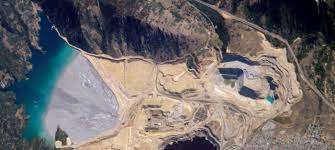New Report Urges Prevention Of Harmful Impacts Of Mining
African News, Latest Headlines Friday, November 12th, 2021
(AFRICAN EXAMINER) – A new report released by Responsible Mining Foundation (RMF) has reiterated the need for the prioritization of the prevention of harmful impacts of mining.
The report noted that lack of adequate corporate measures to prevent harm is by far the most common cause of the reported incidents identified in the study, beyond cases where harmful practices are permitted by law, intentional acts, or integrated into regular business procedures.
The report also observed that prevention of harm is in everyone’s interest, adding that responsible practices can help prevent or at least minimise the worst impacts. It however, acknowledged that lessons have been learned from major harmful impacts over the years, adding that the industry knows what needs to be done.
The RMF study takes into account reports of specific incidents, and does not include ongoing and cumulative environmental impacts such as GHG emissions, deforestation and acid mine drainage. These impacts, while important, are more difficult to capture as they are rarely reported as standalone events.
The report stressed that harmful impacts of mining remain a challenge for society to acknowledge and address. It also stated that sustainability reports tend to focus on how responsible companies are at creating positive contributions and managing ESG risks.
“The term ‘ESG risks’ has become a euphemism for the potential harmful impacts of mining. In the context of the energy transition, industry actors now refer to ‘green’ mining, and mining as a ‘future-enabling’ industry. Yet harmful impacts of mining persist, and it is necessary to name the risks for what they are: harmful to people, environments and economies of producing countries when prevention fails”, the report said.
It further observed that although many mining companies have set in place risk management systems designed to prevent harmful impacts, yet these corporate measures, while basic building blocks of responsible mining, are no guarantee that harmful impacts will be prevented, as incidents still occur when risk management systems are weak or not implemented systematically.
“We still observe high levels of worker fatalities and injuries despite years of international conventions on worker safety. And communities in mining areas are too often exposed to polluted environments and other dangers”, the report added.
It also noted that based on public domain information on the harmful impacts of mining, whereby extraction harms people, environments and economies shows that harmful impacts are not inevitable, and yet they happen across the world, not only in jurisdictions with limited regulatory oversight.
The Chief Executive Officer (CEO) of RMF, Hélène Piaget said the prevalence of mining-induced harmful impacts seen in the study sample of around 1’000 mine sites from 38 companies points to the high risk of such harm across the estimated 35’000 mine sites worldwide. “The normalisation of prevention needs to be prioritised across the industry”, he further declared.
The report also suggested that the lessons that have been learnt so far, need to be shared widely, and applied systematically and proactively. It equally noted that given societies’ dependence on mined resources, and the likely increase in mining activity to support the energy transition, the prevention of harm needs to be acknowledged as a top priority by all companies operating across all jurisdictions.
“Effective prevention of harm will require an honest dialogue with society, compelling leadership from all industry stakeholders, and the normalisation of investment in comprehensive systems of prevention. Governments and regulators should play their part by strengthening preventive regulatory environments and ensuring a safe civic space that enables open dialogue among all stakeholders, and independent monitoring and reporting by civil society, media and others”, the report further explained. .
Related Posts
Short URL: https://www.africanexaminer.com/?p=70544





















